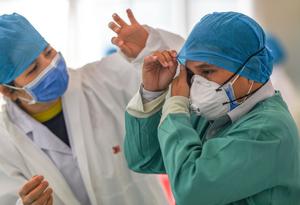 Medical workers at the People's Hospital of Chengmai County in Hainan province practice properly wearing hazmat suits on Feb 11. (PU XIAOXU / XINHUA)
Medical workers at the People's Hospital of Chengmai County in Hainan province practice properly wearing hazmat suits on Feb 11. (PU XIAOXU / XINHUA)
China has met the demand for medical supplies ranging from ventilators and protective suits to testing kits and key drugs in Hubei province, epicenter of the novel coronavirus epidemic, the country's top industry regulator and health authority said on Wednesday.
As viral outbreaks begin overseas, domestic manufacturers of protective suits are also encouraged to export their products to ease the mounting strain facing foreign countries.
As viral outbreaks begin overseas, domestic manufacturers of protective suits are also encouraged to export their products to ease the mounting strain facing foreign countries
Meanwhile, Chinese governments will continue to import advanced machines that cannot be produced domestically, such as extracorporeal membrane oxygenation, or ECMO, to further boost treatment of severe cases, officials have said.
"The overall supply of medical equipment in Hubei has shifted from an acute shortage at the start of the outbreak to meeting demand recently. We are also keeping a close eye on the needs of front-line medical workers to prepare for emergencies," Mao Qun'an, head of the National Health Commission's planning department, said at a news conference on Wednesday.
READ MORE: Energy giants ramp up raw material supplies for protective gear
According to the Ministry of Industry and Information Technology, China has taken multiple measures-including ramping up production of key factories and organizing orderly resumption-to secure supplies.
"Streamlined and accelerated channels for shipments and customs clearance have also been set up to ensure that urgently-needed medical equipment can be delivered on time," said Luo Junjie, deputy director of the ministry's industrial equipment department.
As of Tuesday, key manufacturers have produced over 65,000 pieces of medical equipment, including 14,000 noninvasive ventilators, 2,900 invasive ventilators and 15,000 ECG monitors that record electrical signals in patients' hearts, according to Luo.
"The front-line demands of Hubei have been satisfied. All areas in Hubei, including Wuhan, have been equipped with sufficient devices," he added.
The shortage of protective suits has been one of the greatest concerns amid the epidemic.
Cao Xuejun, deputy director of the ministry's consumer products industry department, said manufacturers' capacities and production volumes of protective suits have increased rapidly.
ALSO READ: US mulls using sweeping powers to ramp up virus gear production
"Each day, we were able to send as many as 250,000 protective suits to Hubei, exceeding regional demands for over a dozen days," she said.
"However, since the disease control work in China is still in a strenuous period, we should not relax production."
She added that the ministry will guide protective suit makers to heed developments in the epidemic and adjust production based on demand.
"We also encourage domestic companies to actively catch up with orders from overseas, export their goods in accordance with relevant regulations and make contributions to the global fight against the virus," she said.
To ensure sufficient supplies of ECMO, a lifesaving machine that provides heart-lung bypass support outside the body for critical cases, China has delivered 67 of the machines to Hubei, where the majority of severely-ill patients are concentrated.
Luo said that within 15 hours, 16 ECMO machines made in Germany had arrived in Wuhan, Hubei province.
In addition, medical assistance teams dispatched to Hubei had also been asked to bring ECMO machines and other essential devices with them.
"We are closely monitoring the use of ECMO and will further strengthen global procurement and domestic coordination to maintain the supply," he added.
Mao from the National Health Commission said although each provincial-level region in China has been affected by the virus, they have not hesitated to lend a helping hand and have prioritized the demand of front-line workers in Wuhan.
He added that the commission is working on establishing a long-term mechanism to secure sufficient medical supplies and stockpiles during an emergency.
Cheng Si contributed to this story.


